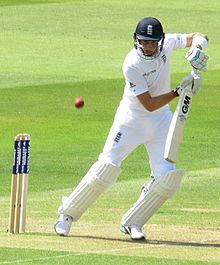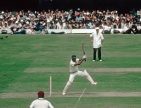Joe Root, Lord Ted and the English classical school
Gareth Bland |
Writing in 1997 the late, great Ted Dexter lamented the disappearance of the classical school of English batting. It was, he argued, a travesty that the creators of the game should have sunk so low in their adherence to the principles of batting and that, in its place, the English batting landscape should be home to a collection of “oddities and misfits”. Fast forward to 2020 and the man dubbed ‘Lord Ted’ would continue to lament that same landscape in his autobiography 85 Not Out.
One modern England player, however, would meet Dexter’s exacting technical standards and gain his seal of approval. Unsurprisingly, England’s modern batting great Joe Root was the man Dexter believed carried the torch and the player to whom Dexter would most willingly offer his guidance and dispense his wisdom on the technical aspects of the complicated business of batting at international level.
It might seem surprising that in his twilight years an octogenarian former England captain should communicate so freely with an icon of the modern game, a game in which club-like bats, ‘Bazball’, The Hundred, Twenty20, and shortened boundaries proliferate, but it should not, perhaps, since Edward Ralph Dexter – “Lord Ted” – was a cricketing revolutionary himself. More than any other cricketer of his generation Dexter embodied a love of cricketing classicism and an adherence to the principle that cricket was a side-on game, with a daring, progressivism and foresight that saw him challenge the very establishment of which he seemed to be such a pillar.
Those of a certain vintage might well remember Dexter as a slightly dotty, eccentric chairman of selectors for England during the period 1989-1993. Prior to his stewardship of the national team, he had been a thoughtful and trenchant analyst of the game for the BBC. Ashes failures aside, his tenure as chairman was not without its moments: a hard-fought 1-2 series defeat against West Indies in the Caribbean in early 1990, and a 2-2 drawn series against the same opposition at home in 1991 were not without merit. Similarly, his structural changes to the county game and to the national side during the same period took time to bear fruit, although pay dividends they certainly did. Central contracts and four-day county cricket were among the changes Dexter brought to the national game during his time in English cricket’s top job.
Still relatively young at 58 when he left the chairmanship in 1993, Lord Ted continued to observe the modern game. As befits a man who was instrumental in popularizing the fledgling limited overs game in England in the early 1960s, Dexter differed from many former players in seeing the merits of Twenty20. Speaking in 2018, Dexter gave a somewhat qualified endorsement of the short format:
“I admire the ingenuity and power of the players. Some of the strokeplay now is superb. My worry is that schools will note that Twenty20 can be all over, bang, bang bang, in a couple of hours, saving the schoolmaster’s time.’
Where Dexter never shifted though was in his belief of the first principles of the game itself: “Cricket is a sideways game – always was and still is” he observed in his blog; one of the most original and forthright set of posts and observations on cricket and life to come from a former player. He was also not in the least parochial in his cricket watching, casting his beady eye over players from around the cricketing world. In 2012, in an interview with the Hindustan Times, he spoke glowingly of Indian right-hander Cheteshwar Pujara, who he described as “wonderful, classical and one of the most correct players I have seen for a long, long time“.
Similarly, in January 2016, during England’s tour of South Africa, Dexter wrote of the young Tembo Bavuma:
“I can pay the diminutive Bavuma no greater compliment than to compare him with the great Tendulkar. Look how still he remains as the ball is bowled. His bat is geometrically vertical in defence. When he drives there is a good stride forward but he forces off the back foot and pulls the short ball with equal aplomb. I will be surprised if he does not continue in the same vein for a while to come”
It is, however, in his relationship with Joe Root that we see Dexter’s best-known link with the modern game in England. Michael Atherton, who Dexter made England captain in 1993 at the age of 25, has said Lord Ted “loved watching Root bat — both the busy intent and classical method of his play”. Concerned over an apparent dip in Root’s form in November 2019, Dexter took to his blog to note:
“Most to worry about is Joe Root’s lack of runs. Even when he does get a few, it is a stuttering process with no rhythm. He is taking twice as long as before to score. I think he knows what is wrong but is finding it difficult to put it right. His clean cut footwork used to be the key. Now there is an impression of him running around with many movements going nowhere. He used to be one of those rare batsmen who put 20 or 30 on the board without you noticing. No longer.”
Again and again, Dexter turned to the basic principles and to the simplicity of footwork, stance, and positioning to rectify the wrongs that lead to downturns in performance at the top level. Unsurprisingly, since he was in the opinion of Gary Player one of the greatest amateur golfers he had ever seen, Dexter even talked cricket technique on the golf course. Of Joe Root’s technical lapses and the adoption of a more front-on stance in 2018, he observed “I tried to remind Joe Root of it the other day. I play golf with Mark Nicholas [the cricket commentator] and I said to him: “I’ve got to send Joe a note, he’s getting squarer and squarer in his stance.”
With Root’s Yorkshire cricketing lineage harking back to that of Herbert Sutcliffe, Leonard Hutton and Geoffrey Boycott, whom Dexter said was the last of the line of the English classical school as far back as the early 1970s, it is unsurprising that Lord Ted should have revered Joe Root in the way he did, right up to his death at the age of 86 in August 2021. On his death Root said “I never really had the pleasure of spending much time with him but he did send me a couple of emails out of the blue when I wasn’t playing so well, telling me how to get back where I wanted to be”
Technical orthodoxy for Ted Dexter did not translate to batting being staid and strokeless but, instead, he viewed it as a foundation for complete batting, both in defence and attack. As he observed of the 1984 touring Sri Lankans:
“A succession of Sri Lankan batsmen came in, each of them with the bat on the ground, each one moved his feet, everyone was beautifully straight, and everyone could pull and hook. The general impression was that they were much better players than our guys. The fact that they could score 491-7 declared in their first innings at Lord’s illustrated that the Sri Lankans had inherited what should have been English qualities. Certainly the public noticed the difference between the two sides and their approach to batting. There were so many comments about the textbook style exhibited by the visitors that you would have thought correct batting was an innovation. It just went to show that we had completely lost our way”
In the week that Joe Root himself became the fastest player to achieve 11,000 Test runs and become the second English player to reach the milestone, it would give Ted Dexter immeasurable pride to see the style and method in which that feat was achieved.






Great article
Comment by Roy Gibbs | 5:57am BST 7 June 2023